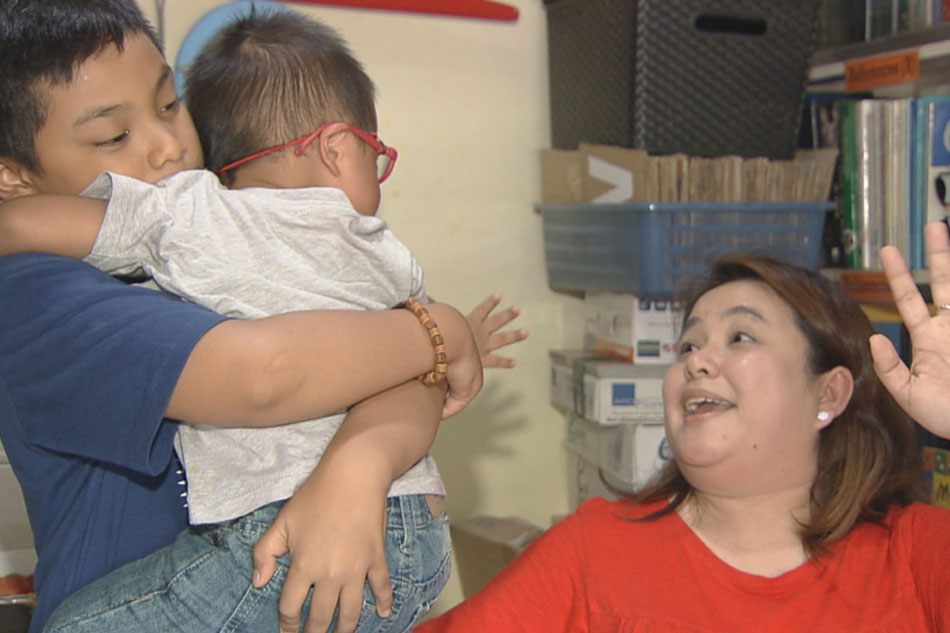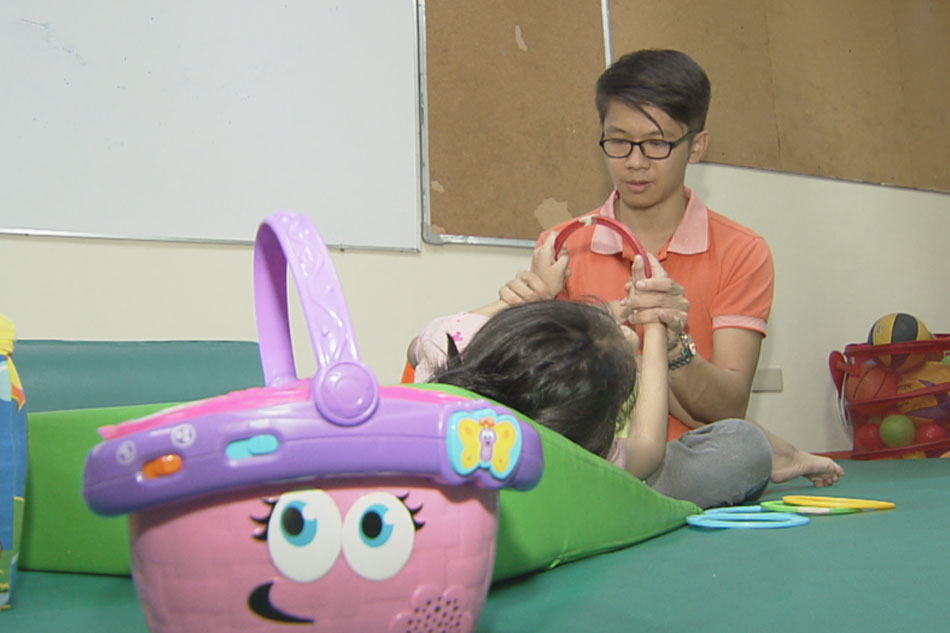Gov't urged to uphold education rights of special needs children | ABS-CBN
ADVERTISEMENT

Welcome, Kapamilya! We use cookies to improve your browsing experience. Continuing to use this site means you agree to our use of cookies. Tell me more!
Gov't urged to uphold education rights of special needs children
Gov't urged to uphold education rights of special needs children
Michael Joe Delizo,
ABS-CBN News
Published Jun 01, 2019 06:28 PM PHT
|
Updated Jun 01, 2019 07:05 PM PHT
MANILA – Since January, Alice Villegas, 41, has been religiously bringing Mathis, her 2-year-old child with down syndrome, at a therapy center in Quezon City to provide him early intervention.
MANILA – Since January, Alice Villegas, 41, has been religiously bringing Mathis, her 2-year-old child with down syndrome, at a therapy center in Quezon City to provide him early intervention.
She hopes that Mathis would someday be able to go to school and optimize his full potential.
She hopes that Mathis would someday be able to go to school and optimize his full potential.
“I just hope na he’ll be independent kasi, siyempre, eventually mawawala kami so ’yun ’yung itinuturo namin,” Villegas shared with optimism.
“I just hope na he’ll be independent kasi, siyempre, eventually mawawala kami so ’yun ’yung itinuturo namin,” Villegas shared with optimism.
“[Sana] makakuha rin siya ng employment, makatulong din siya sa iba.”
“[Sana] makakuha rin siya ng employment, makatulong din siya sa iba.”
ADVERTISEMENT
[I just hope that he’ll be independent because, of course, eventually we will be gone so that is what we are teaching. Hopefully, he would also get employment and be able to give back to others.]
[I just hope that he’ll be independent because, of course, eventually we will be gone so that is what we are teaching. Hopefully, he would also get employment and be able to give back to others.]
Also a mother of an 11-year-old boy, Villegas said her hopes come with preparing financially.
Also a mother of an 11-year-old boy, Villegas said her hopes come with preparing financially.
“We’re really saving up kasi alam namin na mahaba-haba pa ’yung tatahakin nu’ng anak namin,” she said.
“We’re really saving up kasi alam namin na mahaba-haba pa ’yung tatahakin nu’ng anak namin,” she said.
“And may mga nakakasama rin ako na, I understand, medyo late na o hindi nila napapa-therapy ’yung anak nila kasi it’s really expensive. So sana magkaroon ng more facilities like other countries na kung hindi man free, sana mayroong mga mas malalaking discount for people with disability kasi it will really help a lot of children.”
“And may mga nakakasama rin ako na, I understand, medyo late na o hindi nila napapa-therapy ’yung anak nila kasi it’s really expensive. So sana magkaroon ng more facilities like other countries na kung hindi man free, sana mayroong mga mas malalaking discount for people with disability kasi it will really help a lot of children.”
(We’re really saving up because we know that our son has a long way to go. And I know others that, I understand, are late or they can’t have their child go to therapy because it’s really expensive. So I wish that there would be more facilities like other countries that if not free, there would be bigger discounts for people with disability because it will really help a lot of children.)
(We’re really saving up because we know that our son has a long way to go. And I know others that, I understand, are late or they can’t have their child go to therapy because it’s really expensive. So I wish that there would be more facilities like other countries that if not free, there would be bigger discounts for people with disability because it will really help a lot of children.)
ADVERTISEMENT
Data from the Department of Education (DepEd) shows that only 2 percent of the 5.49 million children with special needs (CSN) are getting government assistance, and 97 percent of children aged 7 to 12 are not in school.
Data from the Department of Education (DepEd) shows that only 2 percent of the 5.49 million children with special needs (CSN) are getting government assistance, and 97 percent of children aged 7 to 12 are not in school.
Special education expert consultant Genevieve Rivadelo-Caballa of ALRES Philippines said a lot of children fall out from the system because of limited facilities designed for their requirements and lack of teachers who are equipped to cater to them.
Special education expert consultant Genevieve Rivadelo-Caballa of ALRES Philippines said a lot of children fall out from the system because of limited facilities designed for their requirements and lack of teachers who are equipped to cater to them.
“The government has to take care of the least. We can see how progressive a society is depending on how well the government is able to take care the least of its members, and that includes persons with disabilities, especially those from the poorer segment of society because they are doubly marginalized. So it is the responsibility of the government to provide accessible health care and education for them,” she said.
“The government has to take care of the least. We can see how progressive a society is depending on how well the government is able to take care the least of its members, and that includes persons with disabilities, especially those from the poorer segment of society because they are doubly marginalized. So it is the responsibility of the government to provide accessible health care and education for them,” she said.
According to the Global Childhood Report 2018 of London-based child aid agency Save the Children, over 1.3 million children aged 5 to 15 years old in the Philippines are out of school.
According to the Global Childhood Report 2018 of London-based child aid agency Save the Children, over 1.3 million children aged 5 to 15 years old in the Philippines are out of school.
Alberto Muyot, chief executive officer of the agency’s Manila office, is pushing for the effective implementation of inclusive education, which will welcome and support all students whoever they are and whatever their abilities or requirements. This means making sure that the teaching method, curriculum, and school facilities are appropriate for all children at all levels.
Alberto Muyot, chief executive officer of the agency’s Manila office, is pushing for the effective implementation of inclusive education, which will welcome and support all students whoever they are and whatever their abilities or requirements. This means making sure that the teaching method, curriculum, and school facilities are appropriate for all children at all levels.
ADVERTISEMENT
“1.3 million is 1.3 million. So 1.3 million is too many because all children should be in school,” Muyot, a former DepEd official, said in an earlier interview.
“1.3 million is 1.3 million. So 1.3 million is too many because all children should be in school,” Muyot, a former DepEd official, said in an earlier interview.
He added: “Importante sa mga bata, as much as possible, na kahit na mayroon silang mga kapansanan ay nakakasama rin sila ng mga ibang bata.”
He added: “Importante sa mga bata, as much as possible, na kahit na mayroon silang mga kapansanan ay nakakasama rin sila ng mga ibang bata.”
(It is important for children, as much as possible, that they are included with other children despite their disabilities.)
(It is important for children, as much as possible, that they are included with other children despite their disabilities.)
DepEd Undersecretary Jesus Mateo said the government is doing its part to cater to special needs students with the training of teachers and the construction of CSN-friendly facilities, from hallways, to classrooms, and comfort rooms.
DepEd Undersecretary Jesus Mateo said the government is doing its part to cater to special needs students with the training of teachers and the construction of CSN-friendly facilities, from hallways, to classrooms, and comfort rooms.
There are now over 600 public schools across the country equipped for special needs students.
There are now over 600 public schools across the country equipped for special needs students.
ADVERTISEMENT
“’Yung ating mga paaralan ay ayon na ’yan diyan sa mga may special needs. Nagpapatuloy din ang training natin [para sa mga guro] at maliban do’n, mayroon talaga tayong teachers na who will deal for special education. Public po iyon, hindi lang school for special education, kasama po iyan sa normal na schools natin,” he assured.
“’Yung ating mga paaralan ay ayon na ’yan diyan sa mga may special needs. Nagpapatuloy din ang training natin [para sa mga guro] at maliban do’n, mayroon talaga tayong teachers na who will deal for special education. Public po iyon, hindi lang school for special education, kasama po iyan sa normal na schools natin,” he assured.
(Our schools now are designed for those who have special needs. We have continuous trainings for teachers and apart from that, we actually have teachers who will deal for special education. That is public, not just for special education, they are also in our normal schools.)
(Our schools now are designed for those who have special needs. We have continuous trainings for teachers and apart from that, we actually have teachers who will deal for special education. That is public, not just for special education, they are also in our normal schools.)
The House of Representatives last week unanimously approved on third and final reading House Bill No. 9104 that mandates all public school divisions of the DepEd to establish an Inclusive Education Learning Resource Center for children and youth with special needs (CYSN).
The House of Representatives last week unanimously approved on third and final reading House Bill No. 9104 that mandates all public school divisions of the DepEd to establish an Inclusive Education Learning Resource Center for children and youth with special needs (CYSN).
With this, an inter-agency coordinating council shall be created to undertake the following functions:
With this, an inter-agency coordinating council shall be created to undertake the following functions:
- Develop and set criteria on Individual Educational Programs
- Implement appropriate and coordinated programs in health and related physiological and psychological health services, multidisciplinary domains, transportation and accessibility for children with special needs
- Initiate change and act as source for information for the benefit of both special needs and regular students
- Constitute and authorize a multidisciplinary body to conduct an annual audit to determine the compliance of the centers
- Document, monitor and assess the performance of the centers and their personnel; and
- Coordinate and disseminate information with partner agencies and local government units
- Develop and set criteria on Individual Educational Programs
- Implement appropriate and coordinated programs in health and related physiological and psychological health services, multidisciplinary domains, transportation and accessibility for children with special needs
- Initiate change and act as source for information for the benefit of both special needs and regular students
- Constitute and authorize a multidisciplinary body to conduct an annual audit to determine the compliance of the centers
- Document, monitor and assess the performance of the centers and their personnel; and
- Coordinate and disseminate information with partner agencies and local government units
Read More:
special education
inclusive education
ANC
Department of Educaton
DepEd
ALRES Philippines
alternative learning
children with special needs
Inclusive Education Learning Resource Center
children and youth with special needs
ADVERTISEMENT
ADVERTISEMENT




